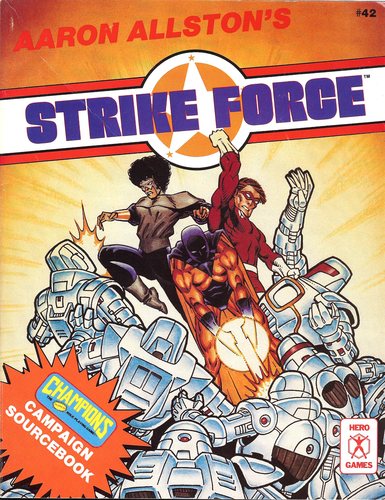One of my favorite sourcebooks of all time
Strike Force by Aaron Allston was a sourcebook for Champions that came out shortly before Champions II (which incorporated many of the "house rules" from Strike Force). Basically, Strike Force is a journal of the campaign Allston lead using the Champions rules. It includes sections on how to run a supers RPG, including what comic-book conventions are nearly impossible to place within an RPG format. It also has the roster of the eponymous superhero team Strike Force and its split-off group Shadow Force, both in their initial 250-point versions and their later, post-XP award versions as well.
Why do I love this book above all others? First, it has an extensive section on Game Mastering that is still in many ways superior to a lot that is out there. Remember that this was a pretty early book as gaming books go, and I think may have actually coined terms like "Rules Lawyer." The discussion isn't grounded in sophistry regarding narrativist vs. gamist philosophy, but rather practical things like "what do you do when a player doesn't show up" or "how to handle romance stories in a game." In the pre-internet era he tackles issues like between-game player activity. It's a brass-tacks-and-beer-bottles approach to supporting fledgling gamemasters that I think we could all use a little bit more of.
Second, he chronicles the entire campaign. Keep in mind, this is several years (years!) of playing basically one campaign. Or rather, multiple campaigns in a single world, since one of the things you read about is the way they cycled in other gamemasters, etc. The text alternates between the plot narrative and italicized notes from the real world activity. For example, it might say "Red Archer was placed in suspended animation in a magical block of amber," while the italicized portion would talk about how the player had been deployed overseas in the military, and this was a way of removing the PC from play.
Now running a multi-year campaign has been a sort of Holy Grail for me. My current campaign is about at the two-year mark, and while feeling a bit of the strain that Allston felt, I'm taking his advice: stop running the game and take some time off. There's actually a one-year gap in play, after which the campaign returned in high gear. But you also see Allston's self-admitted mistakes and mis-steps, his learning process and his evolution. And he does so in a fascinating, humorous, and self-depreciating manner.
When I think about what I might be able to contribute to the hobby, what I might aspire to in terms of blogging, this book sets the standard. I still regularly break it out and read it, just to be reminded of the wisdom inside.



I long to dig up a copy of this bad boy. Been trying to get a hold of it for years.
ReplyDeleteI've run a number of one or two year long campaigns but only one multi-year campaign to speak of.
Believe it or not it was using Dungeons & Dragons. To be more specific, it was my D&D-But-Not / Medieval Superheroes campaign, which lasted roughly 3 and half years (possibly four if you added up some of the after campaign spin-offs and one-shots).
The two longest running ones I am personally aware of were a Champions campaign from 1981-82 to roughly 1992-93 and a Traveller game that started in the early 80's and is still running to my knowledge. I got a change to play in both (although the Traveller one only briefly).
I've only managed a 6-month campaign. Would love to read this book but whenever I see it, the seller is asking a ridiculous price.
ReplyDelete